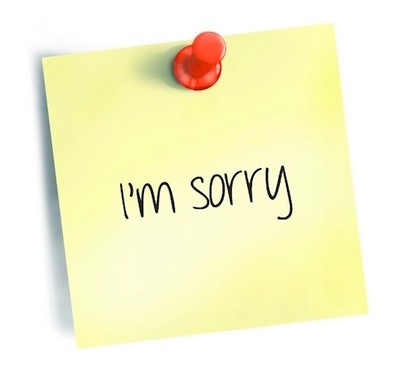There are three little words that may be harder to say than "I love you"...
Valentine's Day is fast approaching. In part one of our apology series we talked about how love sometimes means saying: "I am sorry."
These superwords, as we call them, may be less popular this time of year than "Be My Valentine." Sometimes, though, asking someone to be your Valentine means more than flowers, chocolate, and saying the other three words -- "I love you."
"Be My Valentine" can mean asking for love in a relationship, for partnership in life's adventures. It means enjoy my successes, support me when life gets hard, and I will do the same for you. And it means talk to me -- about frivolous nothings, random anythings, and essential everythings. It can also mean saying "I'm sorry."
---
WHY COMMUNICATION MATTERS
The trust, empathy, and closeness that make for a loving relationship are built on effective communication. When a couple talks around a problem, or jumps around among multiple problems, or does not listen to each other, out comes anger or resentment. But effective communication by a couple brings greater emotional intimacy as well as sexual and relationship satisfaction.
A prominent couples researcher, Dr. John Gottman, studied and labeled the ways couples communicate. When it comes to conflict, some couples -- deemed "avoidant" by Gottman -- agree to disagree. "Validating" couples address conflict by making sure that each person's view is understood and appreciated. "Volatile" couples are passionate and energetic, unafraid of conflict, while "hostile" couples are contemptuous with one another. Though "avoidant," "validating," and "volatile" styles were initially thought to be associated with equally positive relationship outcomes, a more recent study tells us that "validating" couples are the most likely to describe themselves as satisfied and their relationship stable.
WHEN COMMUNICATION MATTERS
Communication with a partner always matters, but never more than when conflict happens. Common topics of disagreement include: how to achieve a satisfying balance of individual vs. couples activities; what to expect from your partner's relatives -- and your partner -- when dealing with family; how to discipline a child; responsibility for chores; and finances.
Consider a recent conflict you and your partner experienced or one that occurs regularly. As an example, imagine a conflict about whether to spend some of your mutual savings on a beach trip. The following five questions -- that you can ask yourself -- illustrate how to adopt a "validating" style:
• What happened? Be specific and objective -- as though you were a reporter writing a news article.
I was reading an article online about the 10 best beaches to visit. It had been a stressful day at work and I was feeling irritated because yet another snowstorm was on its way. At 7 p.m., my partner came home from work. As he took off his coat, I told him that I thought we should go to one of the exotic locations featured in the article. He said it would be too much money. I replied that he is never willing to spend money on anything fun. I called him a cheapskate, stormed away, and went out to meet a friend.
• What is there to be sorry about? In a conflict, both parties usually have reason to apologize. Because you cannot control what your partner thinks, feels, or does, start by focusing on what made you feel bad about your part of the interaction.
I regret calling him a cheapskate. I know that it's important for us to be saving money right now for our future. Walking out dramatically didn't fix anything.
• What could have been different? Imagine hitting the "rewind" button. Where might you have "paused" and "re-recorded" with a better comment?
I might have waited to talk to him about the beach trip -- not right after he walked in the door. I could have suggested a more modest trip, not one of the most exotic, expensive options. I could have expressed my wish to get away instead of labeling him a "cheapskate." I could have stuck around even though I was upset -- maybe call a friend, rather than go out.
• How high are the stakes? On a scale from 1 to 5, with 5 being the highest, how important to you is the conflict? How will it impact your relationship if you sort it out, avoid it, or let it escalate?
The stakes are modest, say a 3. Where we go on vacation is not critical to our happiness. But it's really important that we get on the same page about spending and saving money. If we avoid it altogether, we will keep fighting about it.
• How might apology enhance romance? Imagine two scenarios: one in which you do nothing, and one in which you say, "I am sorry."
Scenario 1: By doing nothing, he may feel angry or disrespected. He may not trust me to be able to talk a problem through when I don't get what I want. This will create distance between us, and interfere with future communication.
Scenario 2: But if I say, "I am sorry" it will show that I heard him. It could open up a conversation. We could be on our way to solving problems together, which is essential to a healthy relationship. This would bring us closer and open the door for romance.
PREPARING TO SAY "I AM SORRY"
Saying "I am sorry" can be a scary proposition. Doing nothing may feel easier. We sometimes think someone else should apologize, not me! We may be really uncomfortable saying "sorry" or not knowing how it will be received. As tough as apology may be, inaction carries a bigger price.
To prepare to say "I am sorry," ask yourself:
• What am I afraid might happen if I apologize?
• What good might happen if I apologize?
• How can I apologize well and move on? (For more on this, see part three of our apology series.)
Everyone can get better at saying "I am sorry," no matter what type of apologizer you are. The payoff is a better relationship, and the romance that comes back into your life.
In the next and last of this three-part apology series, we will offer strategies for both how to say "I am sorry" and for offering forgiveness. Get ready... Valentine's Day is getting closer.
---
Dr. Glasofer is a clinical psychologist and Assistant Professor of Clinical Psychology in Psychiatry at Columbia University College of Physicians and Surgeons.
Dr. Sederer is a psychiatrist, Adjunct Professor at the Columbia/Mailman School of Public Health, and Medical Editor for Mental Health for The Huffington Post. www.askdrlloyd.com
The opinions expressed here are entirely our own. Neither author receives any support from any pharmaceutical or device company.



